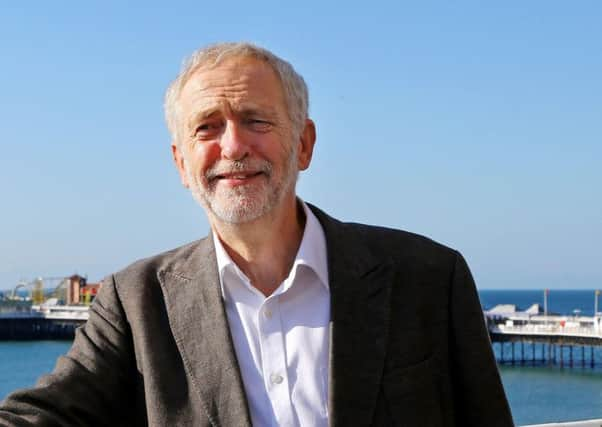Conal Gregory: Corbyn seeking return to dark days of Labour


In the week when the first round of ballot papers are despatched, the left-wing activist has shown his true colours by calling for the public ownership of utility companies and the rail industry.
In effect, he wishes to return to the dark days of the Labour Party by effectively restoring the famous Clause IV.
Advertisement
Hide AdAdvertisement
Hide AdThis form of words committed Labour to securing change on the basis of “the common ownership of the means of production, distribution and exchange”. In effect, this meant nationalisation. Tony Blair secured the overturn of Clause IV in 1995 and immediately made Labour more electorally popular.
Yet many of Corbyn’s supporters have never lived in the dark economic days when Clause IV was the aim.
Supporters of such re-nationalisation appear ignorant of the appalling effect such a policy could cause. It would have a three-fold consequence. Quite apart from the massive cost of compensating shareholders, a large tax hike would have to be undertaken or other financial instrument created to fund future development, whilst the withdrawal of such companies from the market would destroy many savers’ plans.
Savers seek income to pay pension premiums, to have sufficient return to redeem a mortgage and to fund retirement. Some may wish to put enough money aside to pay for children or grandchildren’s school fees.
Advertisement
Hide AdAdvertisement
Hide AdWith deposit accounts paying derisory rates of interest, investors turn instead to the Stock Market, notably corporate bonds and shares. So do pension fund managers, who use their skills to obtain a sufficient return to pay pensioners. A long unbroken record of dividend growth is a sign of financial stability and usually a stock which has low volatility.
Denationalised firms, notably in the utilities sector, are a prime example for such shareholder support. SSE (Scottish & Southern Energy) is just such a useful asset. Its shares yield 5.6 per cent – way above either the top paying easy access account with 1.65 per cent or best notice deposit rate of 1.98 per cent. Those saving through a tax-efficient ISA can at best only obtain 1.51 per cent (easy access), 1.6 per cent (notice) or 2.55 per cent (fixed).
United Utilities, created out of North West Water and Norweb, today yields 4.1 per cent for investors. Seven Trent, born out of denationalisation in 1989, is today worth almost £5.2bn, and yielding a useful 3.7 per cent.
Energy giants form a solid basis for long-term investing. Centrica was formed out of British Gas, which was denationalised in 1986. Today this giant, worth over £13.6bn and yielding 4.9 per cent, contributes a key part to many a pension fund. BP, which yields 6.7 per cent, and even telecommunications firms like BT with a 2.4 per cent yield, are rightly in demand.
Advertisement
Hide AdAdvertisement
Hide AdPresumably Corbyn would wish to stop the success of infrastructure companies like the National Grid, which today is worth over £31.7bn and yields 4.9 per cent.
In a telling survey last year, sponsored by the Pension Insurance Corporation, 23.8 per cent of respondents had invested in infrastructure – essentially energy and utilities.
Many of today’s workforce in privatised companies enjoy share incentive schemes which sets them clearly apart from those still employed in the public sector.
Such plans are tax-efficient and encourage individuals to not only invest but to back their employer over several years. The share price is crucial to determine the final payment. Such participation would cease if Corbyn’s plans bore fruit.
Advertisement
Hide AdAdvertisement
Hide AdThe left-winger has not explained how his ideas would be funded or how a saver can make up the difference once UK quoted companies are withdrawn from the market.
Seeking a similar yield overseas raises the risk level, which is contrary to many investors who place their trust in mighty UK companies.
The same aspirant has crucially added that a wealth tax levied on an individual’s entire assets is a “prospect worth doing”.
Presumably he has seen the new tax transparency regulations which make it more difficult to hide assets.
Advertisement
Hide AdAdvertisement
Hide AdHe has not to date quantified the amount that would be raised, the rate envisaged or how far this could subsidise renationalising companies.
The half-baked rhetoric of the Islington North MP could be dismissed as typical socialist rant and given little credence if it was not for the strong chance that Corbyn will be elected the next Labour leader.
Savers, pensioners and fund providers need to watch this maverick with care.
Conal Gregory is The Yorkshire Post’s personal finance correspondent.